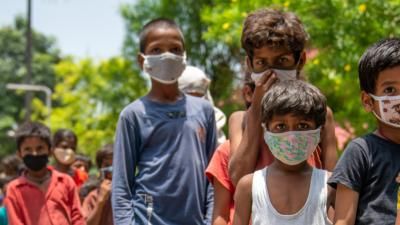
Supporting global communities in making sense of risk
A blog from Padmini Ravi, Project Manager – Risk Know-How, Sense about Science.
This page is approximately a 4 minute read
This page was published on

Over 50% of people in some western countries have experienced, or know someone who has experienced mental health issues, in the last five years.
We are living through a uniquely stressful time. The global COVID pandemic has bought new health concerns to every country in the world, as well as creating new economic stressors. Not only that, at a time when we need our family, friends, co-workers and community most, we have often been denied them, or at least denied the possibility of being in close proximity to them, due to necessary but isolating lockdowns and border closures.
Hopefully most of us will again never experience such a time of loneliness and isolation.
COVID has put pressure on medical, political and economic systems, but it has also put pressure on our collective, global mental health.
Who, in the world, has buckled under this pressure? And in what way? We don’t really know yet, but these are essential questions that at some point will need complete answers, so that we may set policy and redirect funding accordingly.
Blunt indicators of the effects of COVID on our mental health are available already- indicators like hospital admissions and suicides- but eventually we will need a more nuanced understanding, and we at Institute of Economics & Peace hope to use our analytical expertise to help in that work.
Some time ago we at the IEP engaged with the Lloyd’s Resister Foundation to analyse data from their World Risk Poll, which was based on more than 150,000 interviews conducted by Gallup, in 142 countries, including places where little or no data has previously existed.
The poll is unique in the world, and gives organisations like ours an opportunity to not only gauge sentiment and report experience in places where data had not been reliably available, but also to compare sentiment and experiences between countries that are well reported on and those who aren’t.
The overall goal of our analysis work with the poll is to produce the Risk Impact Index, a product that will analyse the drivers of global risk, look at how different risks are connected, and also how these risk elements relate to development, conflict and Positive Peace. This will be part of the IEP’s ongoing mission to find an optimal environment for human potential to flourish.
Our analysis will have a broad focus however, in our early analysis, we have found some interesting places where our focus may be directed.
One of these areas has been in the global understanding of mental health.
Of particular interest has been risk to mental health in highly economically developed countries in the West and also in less economically developed countries in sub-Saharan Africa.
The Lloyd’s Register Foundation World Risk Poll reports that 47 of the 50 countries reporting serious harm from mental ill health come from these two areas.
The causes of risk to mental health in the West may prove to be somewhat different to those in sub-Saharan Africa.
In the West it appears that there is less fear of harm to mental health, compared with sub-Saharan Africa, however the reported experience of mental ill health in the West is high. Over 50 per cent of people in some western countries have experienced, or know someone who has experienced mental health issues, in the last five years.
This tallies with wider research that suggests prevalence of mental health issues has been increasing steadily over the past 20 years; the most affected cohort is now women aged 15 to 25.
In sub-Saharan Africa, experience of mental ill health reported in the World Risk Poll appears to be quite consistent across age groups and genders, but that reporting is not consistent with official national diagnosis and prevalence data.
Official diagnosis and prevalence data in sub-Saharan Africa shows the lowest reported prevalence of mental health harm in any region in the world. However, this may be due to a gap in care, meaning many experiencing poor mental health are undiagnosed, or that there is a difference in cultural understanding around mental health, or perhaps both.
Our analysis of the data continues, but we think even these early findings can provide an interesting baseline from which our post-COVID understanding of mental health can be constructed.
This is only one of the areas that will be analysed in the Risk Impact Index, but we are confident the work we are doing around mental health understanding will be useful to policymakers, researchers, journalists and beyond.
The inaugural IEP Risk Impact Index, driven by the Lloyd’s Register Foundation World Risk Poll data is expected to be released next year.
Disclaimer: all blogs featured are the views of the author and not representative of Lloyd's Register Foundation.